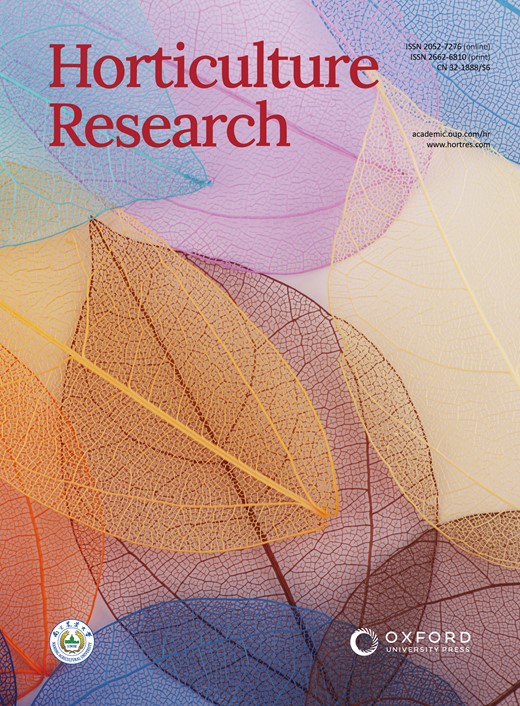水杨酸的全基因组关联研究为茶树选择性育种提供了遗传学启示
IF 8.7
1区 农林科学
Q1 Agricultural and Biological Sciences
引用次数: 0
摘要
水杨酸(Salicylic acid, SA)是一种被广泛认为是调节植物生长和逆境反应的酚类植物激素。尽管具有重要意义,但sa介导的茶树抗生物胁迫的遗传基础尚不清楚。本研究利用从基因分型测序(GBS)数据中获得的79560个高质量单核苷酸多态性(snp),对299份茶叶材料的遗传多样性、群体结构和连锁不平衡(LD)模式进行了研究。我们的全基因组关联研究发现了一个编码9-顺式环氧类胡萝卜素双加氧酶(CsNCED1)的重要基因CSS0033791.1,该基因催化脱落酸(ABA)生物合成的一个重要步骤。外源ABA处理和转基因CsNCED1基因的过表达通过抑制ICS基因的表达降低了各自茶树的SA含量。进一步分析发现,ABA可以降低SA受体基因(NPR1)和NPR1靶基因(PR1和WRKY18)的表达水平,增加植物对生物胁迫的敏感性。此外,斜纹夜蛾(S. litura)的取食行为显示,转基因叶片上的昆虫叮咬面积比野生型大得多,这表明CsNCED1基因在sa介导的免疫应答中具有负调控作用。为今后茶树的抗虫育种、资源的可持续利用以及分子标记辅助(MAS)茶树育种提供依据。本文章由计算机程序翻译,如有差异,请以英文原文为准。
Genome-wide association study of salicylic acid provides genetic insights for tea plant selective breeding
Salicylic acid (SA) is a phenolic phytohormone widely believed to regulate plant growth and stress response. Despite its significance, the genetic basis of SA-mediated resistance to biotic stressors in tea plants is little understood. Our study investigated the genetic diversity, population structure, and linkage disequilibrium (LD) patterns of 299 tea accessions using 79 560 high-quality single nucleotide polymorphisms (SNPs) obtained from genotyping-by-sequencing (GBS) data. Our genome-wide association study identified CSS0033791.1, an essential gene encoding 9-cis-epoxycarotenoid dioxygenase (CsNCED1), which catalyzes a vital step in abscisic acid (ABA) biosynthesis. Exogenous ABA treatment and transgenic overexpression of the CsNCED1 gene lowered SA content in the respective tea plants by inhibiting the expression of the ICS gene. Further analysis revealed that ABA could reduce the expression levels of the SA receptor gene (NPR1) and NPR1 target genes (PR1 and WRKY18), increasing the plant’s susceptibility to biotic stressors. Furthermore, the feeding behavior of Spodoptera litura (S. litura) revealed that the insect bite area on transgenic leaves was substantially more extensive than that in wild-type, implying that the CsNCED1 gene had a negative regulatory role in SA-mediated immune response. This study thus provides the foundation for future insect resistance breeding, sustainable tea plant resource usage, and molecular marker-assisted (MAS) tea plant breeding.
求助全文
通过发布文献求助,成功后即可免费获取论文全文。
去求助
来源期刊

Horticulture Research
Biochemistry, Genetics and Molecular Biology-Biochemistry
CiteScore
11.20
自引率
6.90%
发文量
367
审稿时长
20 weeks
期刊介绍:
Horticulture Research, an open access journal affiliated with Nanjing Agricultural University, has achieved the prestigious ranking of number one in the Horticulture category of the Journal Citation Reports ™ from Clarivate, 2022. As a leading publication in the field, the journal is dedicated to disseminating original research articles, comprehensive reviews, insightful perspectives, thought-provoking comments, and valuable correspondence articles and letters to the editor. Its scope encompasses all vital aspects of horticultural plants and disciplines, such as biotechnology, breeding, cellular and molecular biology, evolution, genetics, inter-species interactions, physiology, and the origination and domestication of crops.
 求助内容:
求助内容: 应助结果提醒方式:
应助结果提醒方式:


